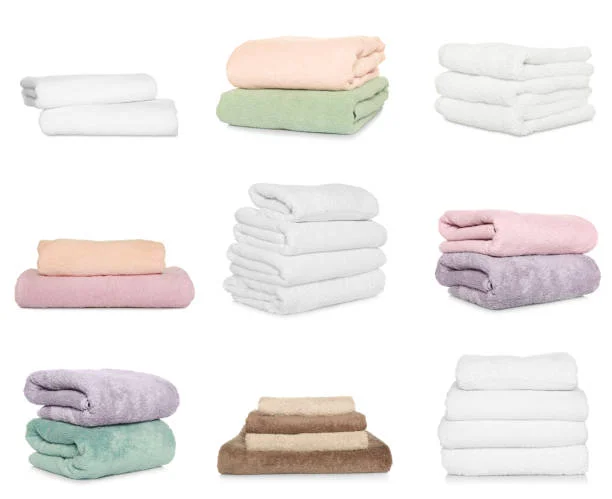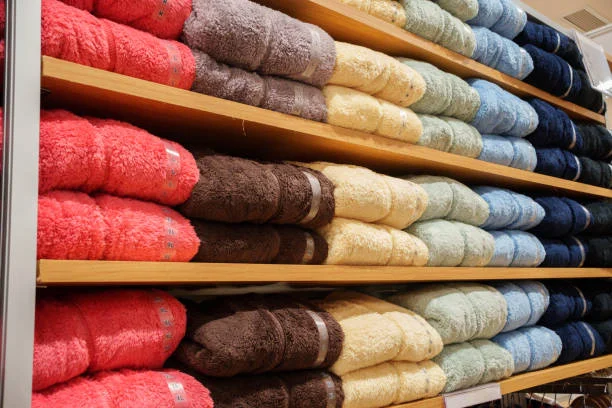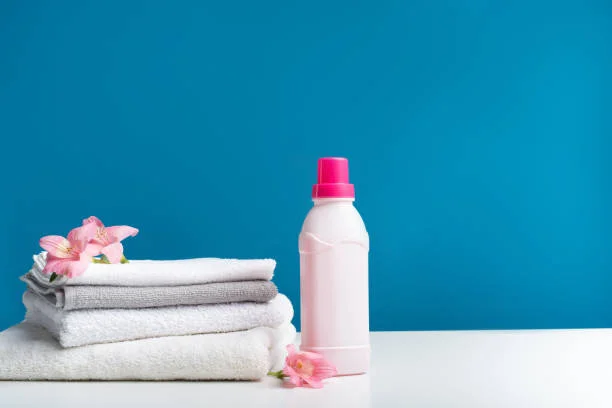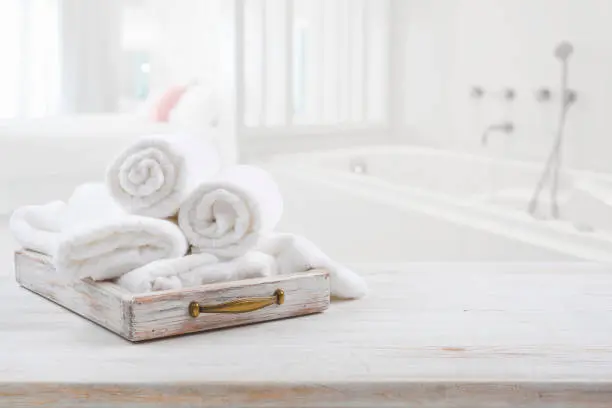After a refreshing shower, a soft, absorbent towel is one of life’s simple pleasures. It not only quickly dries our bodies but also provides a comforting sensation against our skin. However, with countless towel options available in the market, each with its unique materials and manufacturing processes, choosing the right one can be overwhelming. So, what is the best fabric for bath towels for you?
What Fabric Are Bath Towels Made Of?

Bath towels can be made of several different fabrics.
Cotton
Cotton is a very common material. Egyptian cotton and Turkish cotton are often used for high – quality bath towels. The long fibers of Egyptian cotton provide a soft and durable texture. Turkish cotton is thick and plush. Cotton is excellent for absorbing water, feels soft against the skin, and is suitable for those with sensitive skin.
Bamboo
Bamboo-derived fabric is becoming more popular. It’s an eco-friendly option as bamboo is a renewable resource. Bamboo fabric is hypoallergenic and has natural antibacterial properties. It’s soft and absorbent, similar to cotton in its water-holding capacity.
Microfiber
Microfiber is made of very fine synthetic fibers. These towels are highly absorbent and can hold several times their weight in water. They are also quick – drying and lightweight, making them a good choice for travel or for people who need to use their towels frequently and don’t have a lot of time to let them dry.
Linen
Linen bath towels have a rustic charm. Linen is a durable fabric that can withstand a lot of use and washing. It has a natural texture and is absorbent, although not as much as cotton. Linen dries relatively quickly and gets softer over time.
Factors to Consider When Choosing Bath Towel Fabrics

Skin Type
For those with sensitive skin, it is crucial to select fabrics that are hypoallergenic and gentle. Bamboo fiber is an excellent choice as it is naturally antibacterial and less likely to cause skin irritation. It has a smooth texture that won’t rub or chafe the skin. Microfiber can also be a good option as it is generally soft and doesn’t have harsh chemicals that might trigger allergies. On the other hand, for normal skin types, a wider range of fabrics like Egyptian cotton and Turkish cotton can be considered. Egyptian cotton offers a luxurious feel and great absorbency, while Turkish cotton provides a plush touch.
Living Scenarios
- Family Daily Use: In a family setting, durability and absorbency are key. Cotton towels, especially those with a higher GSM (grams per square meter) rating, are often preferred. They can withstand frequent washing and drying cycles and effectively dry the body. Egyptian or Turkish cotton towels can add a touch of luxury to daily bathing routines.
- Hotel Use: Hotels need towels that can maintain their quality after multiple washes and provide a comfortable experience for guests. High-quality cotton towels are commonly used as they offer both softness and durability. They also give a sense of luxury and cleanliness that guests expect.
- Gym Use: Towels used in the gym need to be highly absorbent to soak up sweat. Microfiber towels are a popular choice due to their excellent absorbency and quick-drying properties. They are also lightweight and easy to carry around.
- Travel Use: When traveling, space and drying time are important considerations. Microfiber towels are ideal as they are compact and dry much faster than cotton towels. They can be easily packed in a suitcase or backpack and be ready for use again in a short time.
Budget Constraints
Microfiber: Microfiber towels are usually the most budget-friendly option. They are widely available at relatively low prices, making them accessible for those on a tight budget or for those who need a large quantity of towels, such as in a gym or hotel with a large number of guests.
Cotton: Egyptian cotton towels are usually at the higher end of the price spectrum due to their superior quality and long fibers. They can range from moderately expensive to quite pricey, depending on the brand and thread count. Turkish cotton towels are also relatively costly but may be a bit more affordable than Egyptian cotton. Regular cotton towels are more budget-friendly and can be found in a wide range of prices, from inexpensive basic ones to mid-range options with better quality.
Bamboo Fiber: Bamboo fiber towels are generally priced in the mid-range. They are more expensive than basic cotton but often more affordable than high-end cotton varieties. The cost is influenced by factors such as the quality of the bamboo processing and the brand.
What is the Best Fabric for Bath Towels?

When it comes to choosing the best fabric for bath towels, several options stand out. Cotton is by far the most popular and widely used material. Egyptian cotton, in particular, is highly regarded. It has long fibers that make the towel soft, absorbent, and durable. The long strands allow for a denser weave, which means it can hold more water and dry you off effectively. Turkish cotton is also excellent. It is known for its plush feel and good absorbency. Towels made from Turkish cotton often become even softer with repeated use and washing.
Another fabric to consider is bamboo. Bamboo towels are becoming increasingly popular due to their eco-friendly nature. They are highly absorbent and have a soft texture similar to cotton. Bamboo is also naturally antibacterial and hypoallergenic, making it a great choice for those with sensitive skin. Microfiber is a synthetic option. It is extremely absorbent and dries quickly. Microfiber towels are lightweight and can be a good choice for travel or for those who want a towel that dries fast between uses.
However, cotton still reigns supreme in terms of overall quality and feel. It offers a luxurious experience when drying off after a bath or shower. The thickness and quality of the cotton used can vary, so it’s important to look for towels with a high GSM (grams per square meter) rating for better absorbency and durability.
In conclusion, while different fabrics have their own advantages, cotton, especially high-quality varieties like Egyptian and Turkish cotton, remains the top choice for bath towels as it combines softness, absorbency, and durability in an ideal way.
Should You Use Fabric Softener on Bath Towels?

Whether or not you should use fabric softener on bath towels is a matter of debate.
On one hand, fabric softener can make bath towels feel softer and more pleasant against the skin. It works by coating the fibers of the fabric, reducing friction and giving a silky-smooth texture. This can be especially appealing if you have towels that have become a bit rough over time due to repeated washing and drying. However, there are several drawbacks to using fabric softener on bath towels.
One of the main concerns is that it can reduce the absorbency of the towels. Fabric softeners leave a residue on the towel fibers. This residue can prevent the towel from soaking up water as effectively as it should. Over time, towels treated with fabric softener may take longer to dry you off after a bath or shower, which defeats the primary purpose of a bath towel. Another issue is that the residue from fabric softener can build up on the towels. This build-up can make the towels less breathable and may even lead to an unpleasant odor.
In addition, if you have sensitive skin, the chemicals in fabric softener may cause irritation. If you still want to soften your towels without sacrificing absorbency, there are alternative methods. For example, you can add a cup of white vinegar to the rinse cycle instead of fabric softener.
Vinegar helps to break down any detergent residue and can leave the towels feeling softer without the negative effects on absorbency. You can also try using dryer balls in the dryer, which can fluff up the towels and make them feel more comfortable without the use of chemicals.
Conclusion

In conclusion, understanding the various factors involved in choosing bath towel fabrics is essential for enhancing your daily life. Consider your skin type, lifestyle, budget, and the level of maintenance you’re willing to undertake. Whether you prioritize the softness and luxury of Egyptian cotton, the eco-friendliness of bamboo fiber, or the practicality and affordability of microfiber, there is a perfect towel fabric out there for you.
Don’t rush the decision; take the time to evaluate your needs and preferences. By making an informed choice, you can ensure that every time you step out of the bath or shower, you are greeted with a towel that not only dries you effectively but also provides a comfortable and enjoyable experience. Elevate your self-care routine and make the most of your bathing moments with the right bath towel fabric that suits you best.
